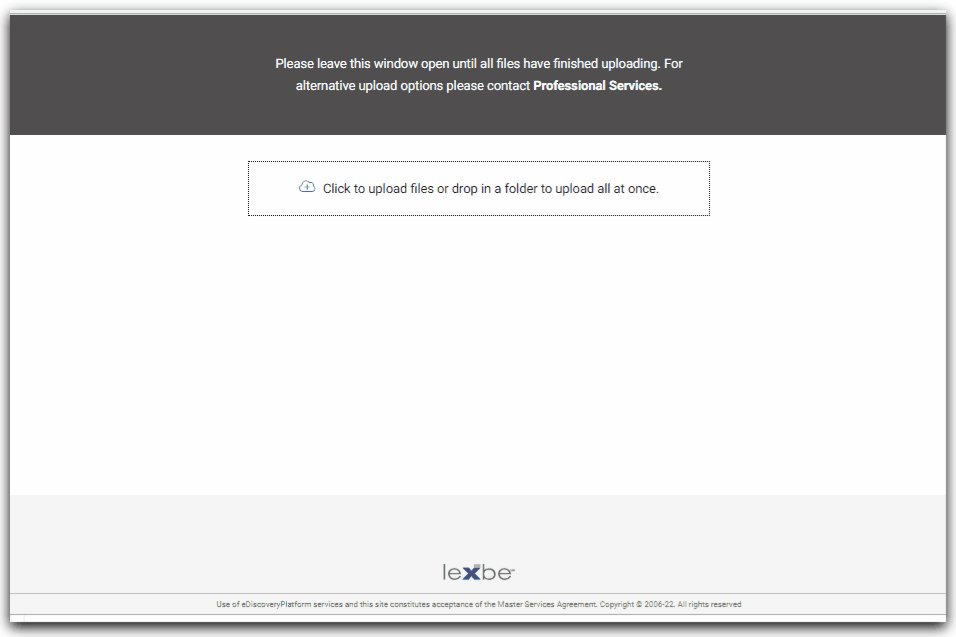
Get Your Electronically Stored Information Processed to a Load File
Lexbe offers a variety of eDiscovery processing and litigation support services to assist law firms and organizations involved in litigation with the challenges of quickly and accurately preparing email, Office 365 documents, Slack messages, instant messages and thousands of other file types, referred to as electronically stored information (ESI), for legal review and for discovery production requests.
With Lexbe’s rapid in-and-out ESI processing for eDiscovery production requests, you’ll be able to comply with the ESI order and fulfill your obligation. Leveraging Amazon’s industry leading AWS cloud architecture, Lexbe auto-scales to TBs of processing power per day in order to deliver lightning fast results. More importantly Lexbe can deliver this eDiscovery processing power at an affordable price.
Whether you are one of the largest firms or the smallest, Lexbe’s eDiscovery processing services will help meet your production deadlines and help solve your eDiscovery challenges reliably and affordably.
Lexbe's High Speed ESI Processing Engine
-
The Industry's Fastest ESI Processing
Hosted in the AWS cloud, the Lexbe ESI Processing Engine auto-scales to maximize the speed and get your production out the door faster.
-
Virtually Unlimited Cloud-Based Processing Power
Lexbe's high speed cloud-based ESI processing is engineered to auto-scale based on the size of the incoming documents. Therefore, more resources are automatically applied to larger jobs which expedites the process.
-
Supports Thousands of File Types
From email and Office 365 documents, to Slack messages and AutoCAD files, the Lexbe ESI processing engine will help you get your production out the door.
-
Myriad of Production Options
If you have to comply with a specific ESI order, Lexbe can help. From PDFs to TIFFs we can ensure that the load files in compliance with the ESI order.
-
Flexible Processing Offerings to Meet Your Needs
Lexbe will help you comply with your ESI order. There are several options for in-and-out processing jobs, including data culling, native document processing to native and PDF load file, native document processing to a TIFF load file, OCR options, language translation options, and more.

Lexbe’s Professional Services team is highly experienced in managing in-and-out ESI processing jobs and can help law firms streamline the process and reduce the risk of errors or data loss. They use advanced eDiscovery technology and workflows to efficiently collect, process, and analyze ESI, ensuring that all relevant data is identified and preserved in a defensible manner.
One of the key benefits of working with Lexbe’s Professional Services team is their deep understanding of eDiscovery technology and their ability to leverage the full capabilities of Lexbe’s powerful eDiscovery software platform. They can help law firms optimize their workflows and processes, ensuring that in-and-out ESI processing jobs are completed quickly and accurately.
Throughout the in-and-out ESI processing process, Lexbe’s Professional Services team provides ongoing communication and support to law firms. They keep law firms informed of the status of their ESI processing job and provide regular updates on progress and any issues that may arise. They are also available to answer any questions that law firms may have and provide guidance and support throughout the process.

Discuss the scope of your matter with a professional services expert today, commitment-free!
The Role of the Load File
A load file is a type of electronic document that contains information about the documents or data that are being produced or received in the context of a legal matter, such as a lawsuit or an investigation. The load file provides a standardized way of organizing and identifying the documents or data, and can be used to facilitate the transfer of information between parties, as well as to manage the information within a document review platform.
Load files typically include metadata about each document or data file, such as the file name, file type, date created, date modified, author, recipient, and other relevant information. They may also include coding information, such as tags or labels that describe the content or relevance of the document, or notes that indicate any privileged or confidential information that should be protected.
Load files are often used in eDiscovery, which is the process of identifying, preserving, collecting, processing, reviewing, and producing electronic documents and data in the context of a legal matter. The use of load files helps to ensure that the information is organized and managed effectively, and can be easily searched and reviewed by legal teams.
